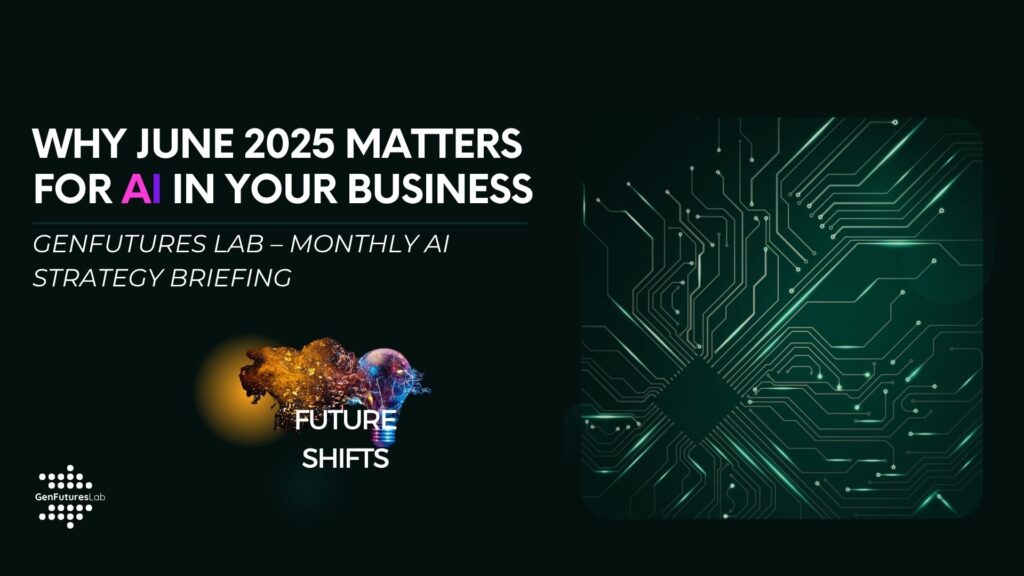Genfuture Lab – Monthly AI Strategy Briefing
After a year of fragmented and experimental AI rollouts, June 2025 marks a decisive moment: the two leading players OpenAI and Google have launched AI infrastructure that is enterprise-ready. OpenAI debuted ChatGPT Business Connectors and its most powerful model suite yet, o3 Pro, while Google made Gemini 2.5 Pro available in public preview with deep integrations across Workspace.
These moves land just as Europe wrestles with how quickly to enforce the EU AI Act. For professionals this month sets the tone for how AI will be securely and strategically embedded into daily workflows and what governance may soon be required.
OpenAI: ChatGPT is Now a Business Platform
OpenAI has moved far beyond the general-purpose chatbot. Its latest updates make ChatGPT a core interface for business data and processes.
- ChatGPT Business Connectors now support native integrations with Google Drive, SharePoint, GitHub, Dropbox, HubSpot, Box, Linear and more. This allows teams to search, index, and extract insights across cloud silos directly inside ChatGPT.
- Meeting capture and Canvas generation: ChatGPT can now join Zoom, Meet, and Teams calls as a bot, producing timestamped notes and auto-generating follow-up documents in Canvas. This effectively replaces third-party AI notetakers and simplifies audit trails for compliance.
- O3 Pro release: OpenAI also released an upgraded version of its “O3” model line. O3 Pro improves reasoning, memory, and multistep instruction following, ideal for customer facing AI and internal support bots.
The cumulative effect is that ChatGPT is now a flexible, cross platform operating layer for knowledge work. If your team relies on cloud based files and SaaS workflows, OpenAI’s latest stack may offer a compelling alternative to Microsoft Copilot or Google Gemini.
https://www.youtube.com/watch?v=tZIFL8yuUaQ
Google: Gemini 2.5 Pro Brings Scale and Control
Google’s Gemini strategy is integration-first. With the release of Gemini 2.5 Pro, AI is now embedded throughout Google Workspace.
Key features:
- 1 million-token context windowacross Gmail, Docs, and Meet lets teams process book length content in a single prompt.
- Deep Think Mode, an experimental setting gated behind safety systems, demonstrates early agentic reasoning by solving complex math and coding tasks.
- Live audio capabilities: New APIs include native audio outputs, enabling more natural text-to-speech with voiced personas, laying the groundwork for advanced voice-controlled customer support and internal tools.
Gemini 2.5 Pro also achieved state of the art performance on the LMArena benchmark, debuting at the top of the leaderboard and showing highly competitive reasoning and coding capabilities against other leading models.
Regulation: EU AI Act Faces Uncertainty
While the EU AI Act was expected to enter enforcement this summer, recent signals from Brussels suggest that the timeline may shift. The European Commission has acknowledged potential delays due to complexity in implementation and legal harmonisation across member states.
Previously announced milestones included:
- 2 February 2025 – Prohibitions on dark-pattern UX and emotion-tracking were meant to take effect.
- 2 August 2025 – General-purpose model providers (OpenAI, Google, Anthropic) were expected to meet new transparency, copyright, and risk-management requirements.
However, these deadlines may be postponed or softened, particularly around the compliance obligations for large foundation models and fine-tuning governance.
What it means for business:
- The legal landscape remains fluid while a brief buffer may emerge, proactive firms should still treat AI governance as a Q3 priority.
- Begin updating vendor contracts to reflect eventual transparency and adversarial testing requirements.
Strategic Recommendations
Q3 2025 action plan:
- Test your data stack: Run ChatGPT Business Connectors against a slice of internal knowledge (e.g. SharePoint + HubSpot). Compare retrieval depth and usability to Gemini’s Workspace tools.
- Adapt procurement: Add annexes to AI contracts now requiring model cards, copyright documentation, and red team test results.
- Build low risk proof of concepts: Use competitively priced models like Gemini Flash or GPT-4o mini for tasks like form processing, internal FAQs, or RPA support. Measure latency and hallucination risk before scaling.
- Train for 1M-token contexts: With expanded windows, prompt engineering shifts focus on document structure, retrieval quality, and “thinking budget” allocation.
- Harden your pipelines: Implement indirect prompt-injection tests using open source scripts and request AI-RMF-aligned security documentation from all model vendors.
Further Reading and Sources
- OpenAI Business Connectors
- TechCrunch – ChatGPT Meeting Tools & O3 Pro
- Google Blog – Gemini 2.5 Pro
- EU Today – Potential AI Act Delay
Genfuture Lab helps organisations navigate AI adoption with clarity, compliance, and creativity. Need tailored training, benchmarking, or policy guidance? Contact us to get started.


